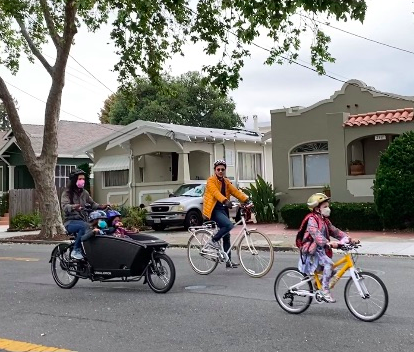Last year, the California legislature set aside $10 million to create a program that would provide incentives for e-bike purchases. Program details were mostly left up to the Air Resources Board, but a few requirements were included in the bill. For example, it set a launch-by date of July 1, 2022 - which has passed without any announcement from CARB.
What little information is available on CARB's website is not easy to find. Staff issued a call for applications for an administrator in April, and held a question and answer session that month. It received applications from three organizations to run the program.
In response to questions, CARB staff said they are not yet ready to choose an administrator yet, but are also not at this time considering issuing another call for applications.
This delay is a problem for many reasons, not least that people are waiting to find out when the state will offer incentives to buy e-bikes. The California Bicycle Coalition maintains a list of over 5,500 people who are waiting for news of the program. (You can sign up for CalBike's list and receive updates when the program eventually launches here.)
Putting off a decision adds delay to an already slow-moving process, and could push the program start date out until after the end of the year. Other sources of e-bike incentives, including under the Clean Cars for All program being handled by regional air districts, have been just as slow to get going.
It almost feels as if CARB is more than reluctant to offer these incentives, even though it is increasingly clear that e-bikes can be excellent replacements for private cars. Their carbon footprints, costs, parking requirements, and the space they take up on roads is also considerably less than that of electric cars, and CARB doesn't seem to have much trouble pushing EVs as a climate solution.
The application process asked potential administrators numerous detailed questions, but CARB has provided only a bare minimum of information to the public, including the names of the applicants and how much they applied for.
The three are:
- The Center for Sustainable Energy, an organization that current administers CARB's Clean Vehicle Rebate Program. For some reason, this applicant has only applied for $2.5 million for the $10 million program. It's not clear if this is a mistake, or the application was focused just on administration, for which a maximum of $2.5 million was allowed.
- GRID Alternatives, which currently runs Access Clean California, CARB's "one-stop shop" to provide information and assistance on the various clean energy rebates and incentives offered by California. GRID Alternatives would be partnering with Ecology Action, an organization that works on community sustainable transportation plans and trainings. GRID Alternatives also runs a large solar installation program, which includes workforce development and community outreach.
- Rider Safety Visibility, a group based in San Diego that is connected with a county e-bike encouragement program called Pedal Ahead, a project of former CARB board member and current San Diego County Supervisor Nathan Fletcher. Rider Safety Visibility is also the recipient of a grant to create a young adult workforce development program, but there is little information about that or any other experience on its bare-bones website of mostly blank pages.
It's not clear why choosing an administrator seems to have stalled, but the longer CARB waits to make a decision, the further into the future the launch will be pushed. It seems likely, given the high level of interest, that the incentives would go quickly once the program is launched. But to make sure they go to the people who most need them will require an experienced and competent administrator, and full support from CARB.
And that full support, including a high level of transparency, will also be needed if there is any hope to grow this not-yet-born program beyond the initial $10 million. Which, as a reminder, is but a tiny portion of the $425 million that California is making available for electric car purchases.






